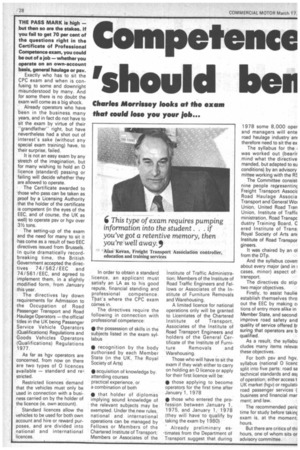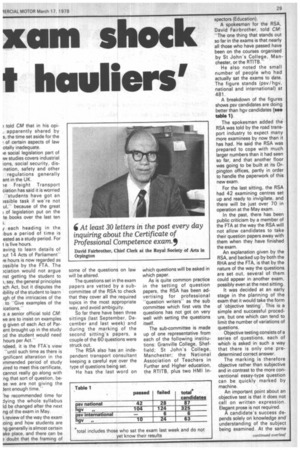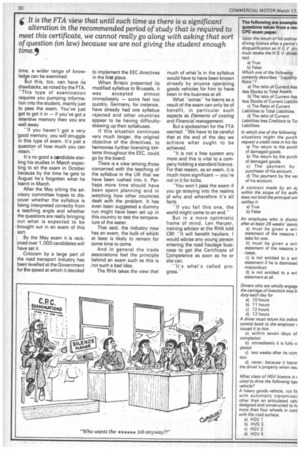competence should bon xam shock t hauliers'
Page 30

Page 31

Page 32

If you've noticed an error in this article please click here to report it so we can fix it.
THE PASS MARK is high — but then so are the stakes. If you fail to get 70 per cent of the questions right in the Certificate Of Professional Competence exam, you could be out of a job — whether you operate on an own-account basis, general haulage or psv.
Exactly who has to sit the CPC exam and when is confusing to some and downright misunderstood by many. And for some there is no doubt the exam will come as a big shock.
Already operators who have been in the business many years, and in fact do not have to sit the exam by virtue of their "grandfather" right, but have nevertheless had a shot out of interest's sake (without any special exam training) have, to their surprise, failed.
It is not an easy exam by any stretch of the imagination, but for many wishing to hold an 0 licence (standard) passing or failing will decide whether they are allowed to operate.
The Certificate awarded to those who pass can be taken as proof by a Licensing Authority that the holder of the certificate is competent (in the eyes of the EEC, and of course, the UK as well) to operate psv or hgv over 31/2 tons.
The setting-up of the exam and the need for many to sit it has come as a result of two.EEC directives issued from Brussels. In quite dramatically recordbreaking time, the British Government accepted the directives 74/562/EEC and 74/561/EEC, and agreed to implement them, in a slightly modified form, from January this year.
The directives lay down requirements for Admission to the Occupation of Road Passenger Transport and Road Haulage Operators — the official titles in the UK being Passenger Service Vehicle Operators (Qualifications) Regulations and Goods Vehicles Operators (Qualifications) Regulations 1977.
As far as hgv operators are concerned, from now on there are two types of 0 licences available — standard and restricted.
Restricted licences demand that the vehicles must only be used in connection with a business carried on by the holder of the licence (ie, own account).
Standard licences allow the vehicles to be used for both own account and hire or reward purposes, and are divided into national and international licences. In order to obtain a standard licence, an applicant must satisfy an LA as to his good repute, financial standing and professional competence. That's where the CPC exam comes in.
The directives require the following in connection with professional competence: • the possession of skills in the subjects listed in the exam syllabus • recognition by the body authorised by each Member State (in the UK, The Royal Society of Arts) • acquisition of knowledge by. attending courses practical experience, or a combination of both • that holder of diplomas implying sound knowledge of the relevant subjects may be exempted. Under the new rules, national and international operations can be managed by Fellows or Members of the Chartered Institute of Transport; Members or Associates of the Institute of Traffic Administration; Members of the Institute of Road Traffic Engineers and Fellows or Associates of the Institute of Furniture Removals and Warehousing.
A limited licence for national operations only will be granted to Licentiates of the Chartered Institute of Transport, Associates of the Institute of Road Transport Engineers and holders of the General Certificate of the Institute of Furni ture Removals and Warehousing.
Those who will have to sit the exam if they wish either to carry on holding an 0 licence or apply for their first licence will be: • those applying to become operators for the first time after January 1, 1978 • those who entered the profession between January 1, 1975, and January 1, 1978 (they will have to qualify by taking the exam by 1980) Already preliminary es-timates from the Department of Transport suggest that during 1978 some 8,000 oper and managers will ente road haulage industry ani therefore need to sit the ex The syllabus for the was worked out (bearir mind what the directive manded, but adapted to su conditions) by an advisory mittee working with the RE The Committee consist nine people repfesentinf Freight Transport ASSOCiE Road Haulage Associa Transport and General Woi Union, United Road Tran Union, Institute of Traffic ministration, Road Transpc dustry Training Board, C ered Institute of Trans Royal Society of Arts an Institute of Road Transpor gineers.
It was chaired by an of from the DTp.
And the syllabus cover about every major (and in ! cases, minor) aspect of transport.
The directives do stip two major objectives.
Firstly, to assist haulie establish themselves thro Out the EEC by making ci tions of entry more alike in Member State, and second, improve road safety and quality of service offered ty suring that operators are b qualified.
As a result, the syllabu eludes many items relevai these objectives.
For both psv and hgv, syllabus (national 0 licenc split into five parts: road sa technical standards and as of operation; either access t UK market (hgv) or regulati, road passenger services ( business and financial mar ment; and law.
The recommended peric time for study before takinc exam is, at the moment, hours.
But there are critics of thi hours, one of whom sits or advisory committee. told CM that in his opi, apparently shared by s, the time set aside for the of certain aspects of law otally inadequate.
le social legislation part of iw studies covers industrial ions, social security, disination, safety and other regulations generally ant in the UK.
le Freight Transport ciation has said it is worried "students have got an )ssible task if we're not ul," because of the great ; of legislation put on the te books over the last ten ;.
each heading in the ibus a period of time is ested as a study period. For t is five hours.
eying to learn details of )ut 14 Acts of Parliament" re hours is now regarded as ossible by the FTA. The )ciation would not argue nst getting the student to 1, say, the general principles 3ch Act, but it disputes the ibility of the student to learn rgh of the intricacies of the to "Give examples of the ications."
.s a senior official told CM: we are to insist on examples .g given of each Act of Parent brought up in the study od the student would need hours per Act.
ndeed, it is the ETA's view "until such time as there is gnificant alteration in the )mmended period of study „tired to meet this certificate, cannot really go along with ng that sort of question, bese we are not giving the Jent enough time.
'he recommended time for dying the whole syllabus Id be changed after the next ng of the exam in May.
\ review of the way the exam ping and how students are rig generally is almost certain ake place, and there can be 3 doubt that the framing of some of the questions on law will be altered.
The questions set in the exam papers are vetted by a subcommittee of the RSA to check that they cover all the required topics in the most appropriate way, and avoid ambiguity.
So far there have been three sittings (last September, December and last week) and during the marking of the second sitting's papers, a couple of the 60 questions were struck out.
The RSA also has an independent transport consultant keeping a careful eye over the type of questions being set.
He has the last word on which questions will be asked in which paper.
As is quite common practice in the setting of question papers, the RSA has been advertising for professional "question writers" as the sub committee which first vets the questions has not got on very well with setting the questions itself.
The sub-committee is made up of one representative from each of the following institutions Granville College, Sheffield; St John's College, Manchester: the National Association of Teachers in Further and Higher education, the RTITB, plus two HMI In spectors (Education).
A spokesman for the RSA, David Fairbrother, told CM: "The one thing that stands out so far in the exams is that nearly all those who have passed have been on the courses organised by St John's College, Manchester, or the RTITB."
He also noted the small number of people who had actually sat the exams to date. The figure stands (psv/hgv, national and international) at 481.
A breakdown of the figures shows psv candidates are doing better than hgv candidates (see table 1).
The spokesman added the RSA was told by the road transport industry to expect many more examinees by now than it has had. He said the RSA was prepared to cope with much larger numbers than it had seen so far, and that another floor was going to be built at its Orpington offices, partly in order to handle the paperwork of this new exam.
For the last sitting, the RSA had 42 examining centres set up and ready to invigilate, and there will be just over 70 in operation at the May exam.
In the past, there has been public criticism by a member of the FTA at the way the RSA will not allow candidates to take their question papers away with them when they have finished the exam.
An explanation given by the RSA, and backed up by both the R HA and the FTA, is that by the nature of the way the questions are set out, several of them could appear in another exam, possibly even at the next sitting.
It was decided at an early stage in the planning of the exam that it would take the form of 'objective testing'. This is a simple and successful procedure, but one which can tend to limit the number of variations of questions.
Objective testing consists of a series of questions, each of which is asked in such a way that there is only one predetermined correct answer.
The marking is therefore objective rather than subjective and in contrast to the more conventional essay-type question can be quickly marked by machine.
An important point about an objective test is that it does not call on written expression. Elegant prose is not required.
A candidate's success depends solely on knowledge and understanding of the subject being examined. At the same time, a wider range of knowledge can be examined.
But this, too, can have its drawbacks, as noted by the FTA.
This type of examination requires you pumping information into the student, mainly just to pass the exam. You've just got to get it in — if you've got a retentive memory then you are well away.
"If you haven't got a very good memory, you will struggle in this type of exam. It's just a question of how much you can retain."
It's no good a candidate starting his studies in March expecting to sit the exam in October because by the time he gets to August he's forgotten what he learnt in March.
After the May sitting the advisory committee hopes to discover whether the syllabus is being interpreted correctly from a teaching angle and whether the questions are really bringing out what is expected to be brought out in an exam of this sort.
. By the May exam it is reckoned over 1,000 candidates will have sat it.
Criticism by a large part of the road transport industry has been levelled at the Government for the speed at which it decided to implement the EEC directives in the first place.
When Britain presented its modified syllabus to Brussels, it
was accepted almost immediately — some feel too. quickly. Germany, for instance,' have already had one syllabus rejected and other countries appear to be having difficulty, drawing up their syllabuses.
If this situation continues very much longer, the original objective of the directives, to harmonise further licensing systems throughout the EEC, could go by the board.
There is a view among. those concerned with the teaching of the syllabus in the UK that we have been rushed into it. Perhaps more time should have been spent planning and in ,watching how other countries dealt with the problem. It has even been suggested a dummy run might have been set up in this country to test the temperature of the water.
That said, the industry now has an exam, the bulk of which at least is likely to remain for some time to come.
And in general the trade associations feel the principle behind an exam such as this is not such a bad idea.
The RHA takes the view that much of what is in the syllabus would have to have been known already by anyone operating goods vehicles for him to have been in the business at all.
What "extras" he learns as a result of the exam can only be of benefit, in particular such aspects as Elements of costing and Financial management.
But a spokesman for the FTA warned: "We have to be careful that at the end of the day we achieve what ought to be achieved.
"It is not a free system any more and this is vital to a company holding a standard licence. For that reason, as an exam, it is much more significant — you're not in it for kicks.
"You won't pass the exam if you go straying into the realms of why and wherefore it's all facts.
"If you fail this one, the world might come to an end."
But in a more optimistic frame of mind, Len Harper, training advisor at the RHA told CM: ''It will benefit hauliers. I would advise any young person entering the road haulage business to get the Certificate of Competence as soon as he or she can.
"It's what's called progress.
























































































































